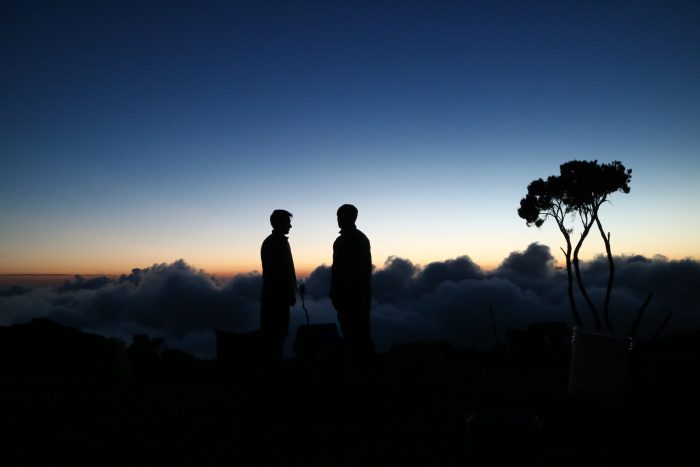Every destination you reach in your life is more than a line crossed off your travel bucket list. It’s an experience that helps you discover new cultures and new ways of life, while at the same time discovering things you didn’t know about yourself.
We travel to India to reconnect with ourselves, we go to Paris to tap into our romantic side, and we visit the Buddhist temples in China to explore our spiritual selves. As for climbing Mount Kilimanjaro, it’s so much more than a travel experience. The way to the 19,341 feet high Uhuru Peak can be a revelatory journey that will teach you many lessons about life, nature, and relationships.
1. Fear can set you back from amazing experiences
90% of people who have a chance to climb Kilimanjaro turn down the experience not because they don’t like the idea, but because they’re afraid it will be too difficult. But as it turns out, Kilimanjaro is actually the most accessible of all seven summits because it has gentler slopes and the summit doesn’t involve any actual climbing, only trekking. That’s not to say it’s the easiest experience: the high altitude will force you to push your limits, but the overall experience of climbing Kilimanjaro isn’t the as demanding as most people imagine. Besides, the guides that organize Kilimanjaro climbs take care of everything, from providing equipment and porters to looking after your safety and making sure you’re hydrated, so you’ll be in good hands.
2. Ambition can help you achieve anything
You don’t need to be a professional climber or a seasoned trekker to climb Kilimanjaro, nor be in tip-top physical condition. There have been world-class athletes who couldn’t manage to get all the way to the top because of altitude sickness, but in 2018 the first female quadruple amputee managed to conquer the peak with no arms, no legs, and only one lung. Don’t feel discouraged if you haven’t worked out in a long time. Climbing Kilimanjaro will teach you that, as long as you set your mind to it, you can do anything.
3. Hakuna Matata
This phrase, made popular by the Lion King, actually originates from Tanzania and means “no worries.” Throughout the summit, you’ll hear Hakuna Matata a lot from your porters and locals and, if you’re a chronic worrier and overthinker, you’ll learn to relax, take it easy and not panic whenever life throws a challenge at you.
4. Be grateful for the small, simple things
Many of the people who climb Kilimanjaro have a life that many consider ideal: a house, a stable job, a decent paycheck and access to everything they want. As you climb Kilimanjaro, you’ll meet Tanzanian locals who live a very simple life and don’t have these luxuries that we’ve come to take for granted.
5. Take it slow
If you’re a competitive person who wants to break records and do things very quickly, you’ll discover that climbing Kilimanjaro is a lesson about patience. As soon as you start speeding up the pace to reduce the climbing time, you’ll hear the porters say pole, pole, which means “slowly, slowly” in Swahili. And they don’t just say this because trekking too quickly will lead to exhaustion a few minutes later, but also because this is their lifestyle. Pole, pole means slowing down to look at the beauty around you, take in the views, and enjoy this once-in-a-lifetime experience. In a modern world that’s so obsessed with speed, focusing on the now is a mindful lesson you need more than ever.
6. Powering through is worth it
Even though Mount Kilimanjaro has one of the most accessible summits, that doesn’t mean you won’t feel uncomfortable at times. You won’t sleep in your usual soft bed, you’ll use wet wipes instead of showers, and when altitude sickness kicks in, you’ll need to push your body to move forward. But once you get to the top, you will be rewarded with the best view you’ve seen and the sense of accomplishment will make you feel like you can do anything. If you need something to motivate you to take on life’s challenges head-on, then climbing Kilimanjaro will awaken your inner warrior and help you believe in yourself.
7. The value of meaningful human contact
Phone and mobile data reception has improved greatly over the years, so during the summit, you won’t be cut off completely from the outside world. However, don’t expect to rely on technology too much. Your social media feed will pale in comparison to the stories of your fellow trekkers and local porters. You will get the chance to meet amazing people, hear breathtaking stories, and create bonds that will last a lifetime.
8. Always channel your inner strength
Before climbing Kilimanjaro, many trekkers try to build motivation by reading books written by famous climbers, listening to self-help audiobooks, or making an inspirational playlist. However, once you get there, you’ll discover that the only thing that will make you move forward is your inner strength. Once you get past the initial stage of enthusiasm and your body begins to feel the physical effort, your mind will adapt, you’ll learn to focus on your breathing and you’ll tap into your inner strength to move forward.
9. You’re never too old
Did you say no to a trip to Kilimanjaro because your body isn’t what it used to be and you feel out shape? Think again. The youngest person to have climbed Kilimanjaro was seven at the time and the oldest person was 85. When it comes to this summit, age really is just a number, so you shouldn’t let it demotivate you.
10. We need to protect our planet
Kilimanjaro Natural Park is one of the most beautiful places you will see in your lifetime and a valuable wildlife habitat that needs to be protected. Unfortunately, the elephants in Tanzania are severely impacted by illegal hunting and authorities are fighting to keep the situation under control. In addition to this, many endangered species are at risk of becoming extinct because of pollution, deforestation, and climate change. On your summit, you’ll learn more about the beauty and fragility of this stunning wildlife habitat and how you can get involved to help protect it.







Read 0 comments and reply